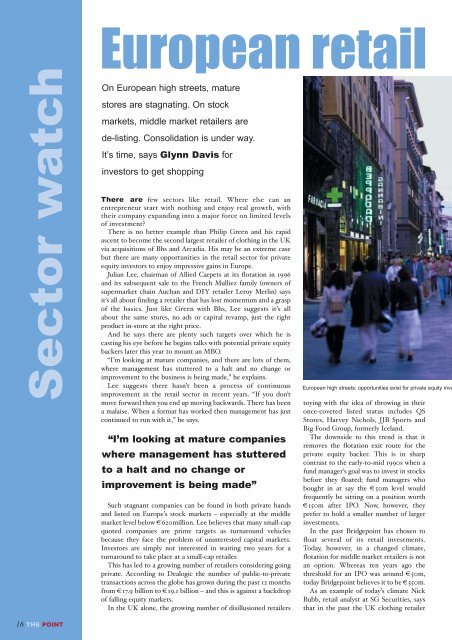Sector watchEuropean retailOn European high streets, maturestores are stagnating. On stockmarkets, middle market retailers arede-listing. Consolidation is under way.It’s time, says Glynn Davis forinvestors to get shoppingThere are few sectors like retail. Where else can anentrepreneur start with nothing and enjoy real growth, withtheir company expanding into a major force on limited levelsof investment?There is no better example than Philip Green and his rapidascent to become the second largest retailer of clothing in the UKvia acquisitions of Bhs and Arcadia. His may be an extreme casebut there are many opportunities in the retail sector for privateequity investors to enjoy impressive gains in Europe.Julian Lee, chairman of Allied Carpets at its flotation in 1996and its subsequent sale to the French Mulliez family (owners ofsupermarket chain Auchan and DIY retailer Leroy Merlin) saysit’s all about finding a retailer that has lost momentum and a graspof the basics. Just like Green with Bhs, Lee suggests it’s allabout the same stores, no ads or capital revamp, just the rightproduct in-store at the right price.And he says there are plenty such targets over which he iscasting his eye before he begins talks with potential private equitybackers later this year to mount an MBO.“I’m looking at mature companies, and there are lots of them,where management has stuttered to a halt and no change orimprovement to the business is being made,” he explains.Lee suggests there hasn’t been a process of continuousimprovement in the retail sector in recent years. “If you don’tmove forward then you end up moving backwards. There has beena malaise. When a format has worked then management has justcontinued to run with it,” he says.“I’m looking at mature companieswhere management has stutteredto a halt and no change orimprovement is being made”Such stagnant companies can be found in both private handsand listed on Europe’s stock markets – especially at the middlemarket level below €620million. Lee believes that many small-capquoted companies are prime targets as turnaround vehiclesbecause they face the problem of uninterested capital markets.Investors are simply not interested in waiting two years for aturnaround to take place at a small-cap retailer.This has led to a growing number of retailers considering goingprivate. According to Dealogic the number of public-to-privatetransactions across the globe has grown during the past 12 monthsfrom €17.9 billion to €19.1 billion – and this is against a backdropof falling equity markets.In the UK alone, the growing number of disillusioned retailersEuropean high streets: opportunities exist for private equity invetoying with the idea of throwing in theironce-coveted listed status includes QSStores, Harvey Nichols, JJB Sports andBig Food Group, formerly Iceland.The downside to this trend is that itremoves the flotation exit route for theprivate equity backer. This is in sharpcontrast to the early-to-mid 1990s when afund manager’s goal was to invest in stocksbefore they floated; fund managers whobought in at say the €50m level wouldfrequently be sitting on a position worth€150m after IPO. Now, however, theyprefer to hold a smaller number of largerinvestments.In the past <strong>Bridgepoint</strong> has chosen tofloat several of its retail investments.Today, however, in a changed climate,flotation for middle market retailers is notan option. Whereas ten years ago thethreshold for an IPO was around €50m,today <strong>Bridgepoint</strong> believes it to be €550m.As an example of today’s climate NickBubb, retail analyst at SG Securities, saysthat in the past the UK clothing retailer16 THE POINT
FEATURE: EUROPEAN RETAILstors to enjoy impressive gainsBon Marche – with a value of about €125m– would have definitely floated whereas itrecently sold out to discount clothingoperator Peacocks.This trend has, however, provided theprivate equity market with an unexpectedopportunity: it has helped fuel the growthin consolidation in the European retailmarket and as a result, deal flow has beenhealthy. If retailers are to hit the radarscreens of the investment banks andinstitutions that pave the way for an IPO,or attract the attention of an acquisitiveretailer looking for critical mass in newmarkets, then consolidation is the key.Most of these consolidation opportunitiesare to be found outside the UKsince many countries in Europe have agreater number of privately heldbusinesses compared with the UK wherethe majority are quoted. This is the resultof the maturity of the UK market whereconsolidation has been under way forsome years.According to Robert Clark, researchdirector at Retail Knowledge Bank:“There are lots of family and privatelyowned businesses in continental Europeand the trend is towards consolidation.Arguably there is a lot of scope for VCs toget involved in this process.”The strategy of buying and thenaggressively expanding a privately ownedretail business in order to attract a tradebuyer is a lucrative route for the likes of<strong>Bridgepoint</strong>. It adopted such a strategywith Longoni Sport (see box p 18), whichit bought from its founder and expandedbefore selling on to Giacomelli Sport.Guido Belli, managing director of theMilan office of <strong>Bridgepoint</strong> <strong>Capital</strong> thathandled the deal, says that althoughsports retailing in Italy has gone throughits consolidation phase there are stillother areas that are ripe for picking suchas clothing, which is still very fragmented.With strong brand names – such asLongoni in Italy and Adams Childrenswearin the UK – there are alsoopportunities to leverage the business notjust through increased store numbers butalso by adding new channels such as mailorder and the Internet. Adopting a multichannelapproach to customers is likely tosecure greater buyer interest on exit.With entrepreneurs often only havingthe skills to take their concept so farbefore they falter, the opportunity for anaggressive rollout – possibly across multichannels– can be a fertile ground forinvestors if their timing is right.<strong>Bridgepoint</strong> believes that with the rightmanagement, a format that works with 40stores, can probably be expanded to 100stores to drive up profits.Management is critical and in retail it isnot always a clearly measurable commoditybecause executives have a penchantfor frequently moving around makingtrack records hard to assess.However, retail has one distinctredeeming feature: “The reason ourindustry likes retail is because most VCshave a financial background and retailbusinesses generate a lot of information,so there are lots of points of reference,”says one <strong>Bridgepoint</strong> director. “You cananalyse the hell out of a retail businessso there’s great comfort on financialmatters.”Bubb agrees. With the numbersanalysed to hell, a roll-out strategy canbe applicable to many retailers: “Anyspecial niche interest retailer has rolloutpotential.”The ideal roll-out is self-financingwhere the payback on new stores isbetween 12 and 18 months as this helps tooffset the problem of bank debt. This is aparticular issue for backers of retail dealsbecause the high rentals inherent in thesector mean the banks lend less than onother deals. They will generally go toaround three times the level of equitybeing put into the business by the VCs,compared with five times for manyother sectors.This lending issue is more acute in theUK where retail rentals are among thehighest in Europe. Germany, however,presents different challenges; its wagecosts are higher and it has fewer roll-outopportunities because of its focus ondiscounters. Because of cheaper goodswith lower margins, these retailers offerless opportunity to increase sales per squarefoot thereby lengthening the payback timeon new stores.These lower sales densities impact profitmargins and in general, the levelsachievable in the UK can often be double“The trend is towardsconsolidation. Arguablythere is a lot of scopefor VCs to get involved”those possible in many other countries.Clark warns: “You need to do yourhomework as many companies have a smallplace in their respective markets and arecompeting in an arena where profitabilityis lower than in the UK.”Despite these structural differences<strong>Bridgepoint</strong> expects to double or triple itsmoney on an investment within a three tosix year time frame regardless of country.With Longoni it achieved 3.6 times inthree years; with its earlier investment inCarpetright it made 10 times its money infour years and with fashion chain NewLook in 1996 it trebled its investment overtwo years.Where consolidation can be tricky iswhere market fragmentation makes itdifficult to create a sizeable operationwithin an acceptable time frame.Convenience stores may appear an idealsector for consolidation – with many shopsin the hands of numerous individuals – butthe time taken to bring these disparateunits together makes it prohibitivelydifficult to tackle.Similarly, fragmentation has been acharacteristic of Spain. When the largeFrench food retailers Carrefour andAuchan entered the market they found it atough task gaining a foothold. TheTHE POINT 17









